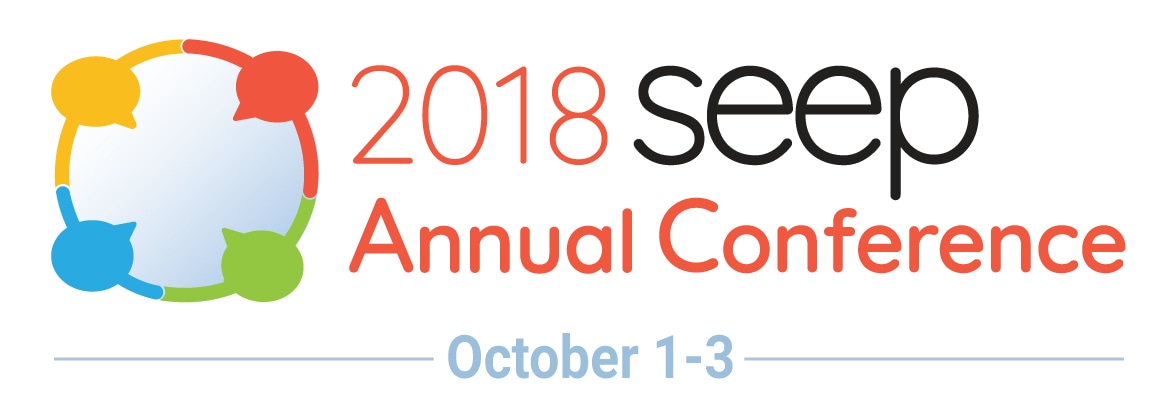
The 2017 SEEP Network Annual Conference brought together leading practitioners, funders, research organizations and private sector actors dedicated to promoting more inclusive and resilient markets and financial systems. Under the conference theme - Catalyzing Transformative Change - we deepened our understanding and commitment to approaches that bring about large scale positive change. We explored insights garnered from behavioral science that enhance impact, strategies that positively address discriminatory social and cultural norms, incentives that help catalyze change in relationships of market actors and engage private sector firms, and transformative new technologies. We shared proven practice and innovative strategies that modify both the structure and dynamics of market systems in ways that contribute to greater empowerment of vulnerable populations. We also examined the important change processes within programs and organizations that lead to more adaptive management and effective learning.
Resilience is defined as the capacity to learn, cope, adapt, and transform in the face of shocks and stresses, including immediate and slow-onset crisis, natural disasters, conflict and instability. A resilience approach supports people, businesses, communities and systems to plan and prepare for risks, cope with disruptions, and adapt to changing contexts. More and more, we are recognizing that resilience needs system-level change.
This track highlighted proven and experimental strategies that use the power of the market to support people, business and systems that are highly vulnerable to the shock-stress-shock cycle. With examples from Africa, MENA and South-East Asia, we explored how market systems can support resilience in refugee populations, during conflict and migration, the transformative roles of social norms and networks and the key moments of innovation. We also explored the potential of, and even tools that support, integrated, systems-level solutions that merge market development, emergency response, financial inclusion, and other programming approaches to sustain progress toward transformative change within communities.
One in three people on the planet remains malnourished, with nearly half of all countries facing multiple serious burdens of malnutrition - both food deficiency and the growing problem of obesity. Large-scale transformative change therefore requires approaches that tackle multiple constraints in food systems simultaneously, with both public and private sector engagement.
Incentives for private sector participation must not work against the goals of food security and nutrition. The fact that an increasing proportion of higher-income populations suffer from over-nutrition, or obesity, suggests a misalignment of these incentives. Development practitioners need to better understand the relationship between rising household incomes and improvements in nutritional status, as these do not always correlate.
This track explored the interrelationships between markets, food systems and nutrition. Conversations focused on the most effective ways to catalyze social and behavioral change, align private sector incentives with social goals, engage with governments to reach these goals, and how to address issues of quality, affordability and access.
Practitioners and policymakers have frequently assumed that simply gaining access to digital financial services or other delivery channels is sufficient for poor and vulnerable people to become financially included. It is increasingly clear that client empowerment – the ability to fully understand and safely use financial services – is crucial for the unbanked and underbanked to take full advantage of financial inclusion. To identify and remove roadblocks – be they cultural, social, structural, systemic or otherwise – that prevent poor and vulnerable people from effectively utilizing financial services (from both private and member-based institutions), practitioners are designing interventions to better understand and support clients’ financial needs and activities. New technologies, such as digital interfaces that enable clients and financial institutions to more effectively utilize financial products at a lower cost, are poised to revolutionize how people in the developing world access and use financial services. Understanding and improving on these technologies and interventions is crucial to catalyze efforts by the world’s 2 billion unbanked and underbanked adults to transform their lives. But at the same time, identifying the weaknesses and limitations of these new technologies is necessary to protect clients during a period of rapid innovation. Contributors to this track examined both proven and emerging technologies that expand financial inclusion and empower recipients of financial services.
Fast, iterative learning and the ability to adapt based on evidence are critical to development actors operating in complex environments. Adaptive management is a programming approach that combines analysis, structured flexibility, and iterative improvements in the face of contextual and causal complexity. It is foundational for bringing about transformative change given the inevitable pivots necessary to respond to increased insight, changing context and program progress.
Adaptive management also demands a different organizational approach, requiring implementation teams to manage their programs more analytically and iteratively to bring about durable outcomes. For programs working with local implementing partners, investments must be made in building value for and capability to carry out learning processes or activities. In recent years, increased attention and resources have been directed to capture adaptation practices within programs and organizations to understand how these iterative learning processes happen, what structures and systems are needed to support such efforts and what impact these practices have on the durability of development outcomes.
Sessions in this track provided grounded experience and evidence of successful approaches to adaptive management and learning within programs and across organizations. We explored the need for intentional learning and adaptation processes, the importance of people at the heart of adaptive management, the role of organizational structure and culture in enabling adaptation, and the role of M&E functions in funneling relevant information and insights for use in decision-making processes.
